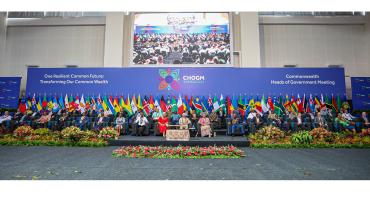Education ministers met in London to review progress and challenges in realising the Nadi Declaration, an agreement made in Fiji to ensure quality education for all.

Education ministers met in London to review progress and challenges in realising the Nadi Declaration, an agreement made in Fiji to ensure quality education for all.
Education reforms
Meeting ahead of International Education Day, education ministers representing all Commonwealth regions presented reforms and initiatives designed to inspire action in other countries.
These ranged from Malta’s reform to give equal value to academic, applied and vocational learning to Fiji’s initiative to integrate climate change in the curriculum. Sri Lanka also unveiled a plan to deliver fee-free education from grade one to first-level university degree.
Ministers discussed challenges hindering progress in this area following research showing little progress has been made over the last decade. Around 250 million children – equivalent to the population of Pakistan – were out of school, representing one in every five children across the world.
Research shows the rate of out-of-school children, aged six to 11, fell from 15 per cent to nine per cent between 2000 and 2008 but that little progress has been made since.

Meeting of the Education Ministers Action Group (EMAG)
Ministers gathered for the fifth meeting of the education ministers’ action group, which convenes annually to review progress against agreed priorities for the education sector.
Fiji Minister Akbar landscape
Deputy Secretary-General Arjoon Suddhoo informed ministers that supporting the right to education for every child is an “urgent priority” for the Commonwealth.
He said: “Despite considerable efforts taken across the world, with the current rate of progress, we will not be able to meet the ambitious commitment to provide quality education for every child by 2030.
“We must take special measures and invest at all levels to ensure we can deliver on our promise of quality education for all.
“The Commonwealth is developing toolkits and guidelines which will help member countries effectively deliver 12 years of free and quality education to every child but there is space to do so much more.”
Research also reveals more than half of children in school are not learning, particularly lacking basic literacy and numeracy skills. For instance, incapable of solving a calculation and unable to understand a city map.
Ministers committed to working together to achieve the priorities agreed in the Nadi Declaration, which includes improving access to and quality of education, removing barriers to girls attending schools and building resilience through a climate-sensitive curriculum.
Commonwealth assistance
During the meeting, the Commonwealth Secretariat, the Commonwealth of Learning and the Association of Commonwealth Universities gave an overview of the technical assistance provided to member countries to accelerate progress.
Fiji’s Minister of Education, Heritage and Arts Rosy Akbar, who chaired the meeting, said she was passionately committed to ensuring everyone, particularly girls, receive 12 years of quality education.
She continued: “Over half of the world’s out of school children are in the Commonwealth. Political leadership across the Commonwealth is essential if we are to achieve the sustainable development goals and secure long-term gains for girls' education.”
The outcomes of the meeting will be discussed at the next Commonwealth Heads of Government Meeting in Rwanda this year to boost progress on inclusive education and to create more jobs for young people.



